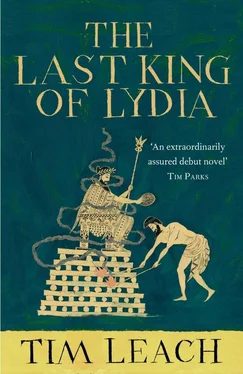Tim Leach - The Last King of Lydia
Здесь есть возможность читать онлайн «Tim Leach - The Last King of Lydia» весь текст электронной книги совершенно бесплатно (целиком полную версию без сокращений). В некоторых случаях можно слушать аудио, скачать через торрент в формате fb2 и присутствует краткое содержание. Год выпуска: 2013, ISBN: 2013, Издательство: Atlantic Books Ltd, Жанр: Исторические приключения, на английском языке. Описание произведения, (предисловие) а так же отзывы посетителей доступны на портале библиотеки ЛибКат.
- Название:The Last King of Lydia
- Автор:
- Издательство:Atlantic Books Ltd
- Жанр:
- Год:2013
- ISBN:9780857899200
- Рейтинг книги:5 / 5. Голосов: 1
-
Избранное:Добавить в избранное
- Отзывы:
-
Ваша оценка:
- 100
- 1
- 2
- 3
- 4
- 5
The Last King of Lydia: краткое содержание, описание и аннотация
Предлагаем к чтению аннотацию, описание, краткое содержание или предисловие (зависит от того, что написал сам автор книги «The Last King of Lydia»). Если вы не нашли необходимую информацию о книге — напишите в комментариях, мы постараемся отыскать её.
The Last King of Lydia — читать онлайн бесплатно полную книгу (весь текст) целиком
Ниже представлен текст книги, разбитый по страницам. Система сохранения места последней прочитанной страницы, позволяет с удобством читать онлайн бесплатно книгу «The Last King of Lydia», без необходимости каждый раз заново искать на чём Вы остановились. Поставьте закладку, и сможете в любой момент перейти на страницу, на которой закончили чтение.
Интервал:
Закладка:
Gyges felt his way along the walls like a blind man. His wide eyes appeared to take up most of his head, which was, as always, covered in long, thick hair. He could only rarely be bathed, depending on his unpredictable whims, and so his appearance was that of a wild man, or a prophet. But prophets spoke, and wild men howled. This son could do neither.
When he looked into the boy’s eyes, Croesus was always grateful for his silence. They seemed to stare through walls, through people, as though they saw through to another place entirely. A terrible place, judging by the fixed expression of horror on the boy’s face.
The king would have preferred to have Gyges kept in some comfortable set of rooms, but his son would not stand to be confined. He would not shout, scream, or make any noise louder than a whistling gasp, but he would pull at his hair, pound on the walls, tear out his fingernails in his attempts to prise open doors and windows if they were barred against him. He was surprisingly strong, and had, on occasion, knocked down a guard or servant who had tried to restrain him. So now they let him go free in the palace, with only one slave, named Maia, tasked to follow him. It was her company alone that he would accept.
Gyges shuffled forward to the edge of the garden. He did not like to walk on anything but stone, and so stopped just before his feet touched earth, as spirits are said to be halted by the shallowest trickle of running water. He stared at his family without apparent recognition. Then he reached out and pointed to Atys, let his hand fall, then raised it again and pointed at Danae. The finger fell once more, and then seemed about to rise a second time. Gyges hesitated, and then instead raised his hand to his chest, the palm facing Croesus, the knuckles against his heart. He turned and walked away, feet dragging against the stones until he was out of sight, Maia following silently in his wake.
None of them spoke for a time. Danae picked at the gold leaf on her necklace. ‘A blessing or a curse, do you think?’ she said at last.
‘Neither,’ said Croesus. ‘He’s no prophet. He sees some other world. He should have been born in that world, not this one.’
Danae did not argue with this. Looking at Gyges, she saw something — a creature worthy of pity, an accident of flesh, a warning from the Gods. But she did not see a son.
In a private chamber in another part of the palace, Solon sat and massaged his aching feet. Isocrates stood in the corner of the room, waiting for the Athenian to ask for wine, music, or simply to be left alone. But the guest made no requests, nor did he ask for his solitude. He was, perhaps, waiting to see when the slave would finally speak.
‘Gout?’ Isocrates said, after a time.
‘Yes.’
‘It is bad?’
‘Yes, I’m afraid so.’
‘You have tried remedies?’
‘Yes, many. None that worked.’
‘That’s because you haven’t tried my cure. Wait here.’
‘You don’t have to-’ But Isocrates had gone. Solon shifted on his chair, clenching folds of his robe in his fist and releasing them, in a distracted, rhythmic motion. It was not long before the slave returned with a silver bowl in his hand, containing a dark red liquid. ‘Drink this,’ he said.
Solon took a sip, and winced at the bitter taste. ‘What is it?’
‘Crocus root in wine.’
‘It tastes foul,’ he said as he drank it down. ‘But I am used to bitter medicine.’
‘Within a week or so, you will feel much better. I will give you some to take with you, and instruct your servants in how to find and prepare it.’
‘Oh, that won’t be necessary. Just give me a year’s supply — I am sure your master can afford to spare it. I don’t suppose I shall last much longer than that.’
Isocrates shrugged. ‘As you will. Though I imagine that the Gods will play a joke on you, and let you live longer; punishment for the arrogance of presuming to know when you will die.’
‘Ah. But then I shall have tricked them into giving me a few more years of life, even if I must be uncomfortable. .’ Solon paused, looking on the slave, and saw his arms were strong and his stance confident — almost too much so, for a man in his position. He had the physical presence of a labourer or a wrestler, not a subtle man of the court. ‘You don’t speak like most slaves I have met,’ he said.
‘Is that a complaint?’
‘It is an observation.’
‘I think you prefer honesty. I can flatter well enough, if it is necessary.’
‘So you are whatever others want you to be?’
‘Something like that.’
‘And do you spy on your guests for your king, after you have put them at their ease?’
‘Sometimes. Not this time. He doesn’t have much interest in you.’ Isocrates allowed himself a small smile. ‘Then again, I would say that, wouldn’t I?’
Solon waved a hand. ‘It doesn’t matter. There’s nothing that I would say to you that I would not say to him.’
‘What can I do for you? Would you like a massage? Shall I find someone to play music for you? We have a lyre player whose musicianship is quite exquisite.’
‘I have always found the Lydian lyre a little shrill for my tastes.’
‘Would you like a woman? Or a young man, if you prefer?’
‘I am almost eighty. A dried-up old man. I have very little to offer a woman these days. Or a man, for that matter. I think you mock me.’
‘Not at all. There is no predicting the appetites of an old man — they can be the most voracious of all. I once had to bring in half a dozen women in succession before a seventy-year-old Thracian could be satisfied.’ Isocrates laughed at the memory. ‘He was an old goat.’
‘Well, I am not he,’ Solon said. ‘But I will accept a massage. This old body aches.’
‘Very well. That is a service I can perform myself.’
Solon undressed and lay on a stone bench at one side of the chamber. As he began to massage the old man, Isocrates found him almost insubstantial, the slack flesh moving aside at the slightest touch, presenting bone.
Solon felt the hesitance of the hands working across his shoulders. ‘I suppose I feel like death, don’t I?’
‘Like a plucked chicken with not enough meat on it.’
Solon laughed. ‘You are a good soul, Isocrates. I like you. Do you enjoy working for your master? Is he good to you? If not, perhaps I can buy you for myself.’
‘He is good to me, and to my wife.’
‘You have a wife?’
‘Yes. We met in this household.’
‘Unusual for a slave. Or is the custom different in Lydia?’
‘No. It is forbidden. But Croesus permitted it, as a reward for my services.’
‘And children? Have you been grateful enough to provide your master with more property?’
‘No.’
The tone of his response was cold and final, and Solon chose not to press him further. ‘So, how did you come to rise to such a prominent position?’ he said instead. ‘Were you a high-ranking man before you became a slave? Forgive me for saying so, but you do not look like one.’
‘No. I was a baker, when I was first taken as a slave. So was my wife. We met in the kitchens here.’
‘Ah. That makes sense. Your massage does have something of the kneading board about it. I feel like a particularly damp piece of dough beneath your fingers. How does a baker get from the kitchens to the throne room?’
Isocrates finished on Solon’s shoulders, and began to work his way down the Athenian’s back. ‘Perhaps you have heard about what happened at the succession of my king?’
‘I heard something. There was a half-brother causing trouble, as I recall.’
‘That’s right. Pantaleon. Croesus was his father’s choice as heir, but when the king died, Pantaleon tried to usurp the throne. His stepmother and other conspirators came to me, gave me poison, and instructed me to kill the king.’
Читать дальшеИнтервал:
Закладка:
Похожие книги на «The Last King of Lydia»
Представляем Вашему вниманию похожие книги на «The Last King of Lydia» списком для выбора. Мы отобрали схожую по названию и смыслу литературу в надежде предоставить читателям больше вариантов отыскать новые, интересные, ещё непрочитанные произведения.
Обсуждение, отзывы о книге «The Last King of Lydia» и просто собственные мнения читателей. Оставьте ваши комментарии, напишите, что Вы думаете о произведении, его смысле или главных героях. Укажите что конкретно понравилось, а что нет, и почему Вы так считаете.












